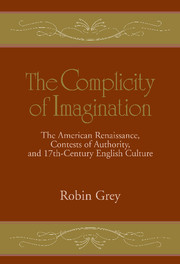 The Complicity of Imagination
The Complicity of Imagination Book contents
- Frontmatter
- Contents
- Acknowledgments
- Cambridge studies in American Literature and Culture
- Introduction: Antebellum America and the Culture of Seventeenth-Century England
- 1 Cultural Predicaments and Authorial Responses
- 2 “A Seraph's Elequence” Emerson's Inspired Language and Milton's Apocalyptic Prose
- 3 Margaret Fuller's “The Two Herberts,” Emerson, and the Disavowal of Sequestered Virtue
- 4 “As if a green bough were laid across the page”: Thoreau's Seventeenth-Century Landscapes and Extravagant Personae
- 5 Melville's Mardi and Moby-Dick, Marvelous Travel Narratives, and Seventeenth-Century Methods of Inquiry
- 6 Surmising the Infidel: Melville Reads Milton
- Notes
- Index
- Cambridge Cultural Social Studies
5 - Melville's Mardi and Moby-Dick, Marvelous Travel Narratives, and Seventeenth-Century Methods of Inquiry
Published online by Cambridge University Press: 05 November 2009
- Frontmatter
- Contents
- Acknowledgments
- Cambridge studies in American Literature and Culture
- Introduction: Antebellum America and the Culture of Seventeenth-Century England
- 1 Cultural Predicaments and Authorial Responses
- 2 “A Seraph's Elequence” Emerson's Inspired Language and Milton's Apocalyptic Prose
- 3 Margaret Fuller's “The Two Herberts,” Emerson, and the Disavowal of Sequestered Virtue
- 4 “As if a green bough were laid across the page”: Thoreau's Seventeenth-Century Landscapes and Extravagant Personae
- 5 Melville's Mardi and Moby-Dick, Marvelous Travel Narratives, and Seventeenth-Century Methods of Inquiry
- 6 Surmising the Infidel: Melville Reads Milton
- Notes
- Index
- Cambridge Cultural Social Studies
Summary
The Poetics of Probability: John Locke, Sir Thomas Browne, and the Marvelous
Recent critics have examined how Melville's fiction and the American political “romance” exploited a common ideological language, one converging on such issues as national expansion, the frontier, and race relations. Others have investigated the participation of Melville's novels and mid-century popular fiction in social reform discourse subversive of conventional and elite values. But we have yet to discern how Melville's writings, by engaging with the mid-century Northeastern culture's rationalist assumptions – its nexus of empirical biases, liberal theological values, political agendas, and literary tastes – were able to fashion critiques of Whig values in the culture's own rationalist vocabulary. Evert Duyckinck's fears about Ishmael (see Chapter 1) illustrate the social and political “dangers” that Americans perceived in transcendentalism and in the rationalist extremes of European deism and atheism. But Melville, disposed neither toward Lockenor toward transcendentalism, explores the implications and reveals the dangers of Britain's “safer” rationalism (both English and Scottish) embraced by America. Indeed, we should remember that in his analogy of two whales hoisted and secured to either side of the Pequod, Ishmael laments the burden of both Lockean and transcendental philosophical biases: “So, when on one side you hoist in Locke's head, you go over that way; but now, on the other side, hoist in Kant's and you come back again; but in very poor plight. Thus, some minds for ever keep trimming boat. Oh, ye foolish! throw all these thunder-heads overboard, and then you will float light and right.”
- Type
- Chapter
- Information
- The Complicity of ImaginationThe American Renaissance, Contests of Authority, and Seventeenth-Century English Culture, pp. 149 - 212Publisher: Cambridge University PressPrint publication year: 1997
